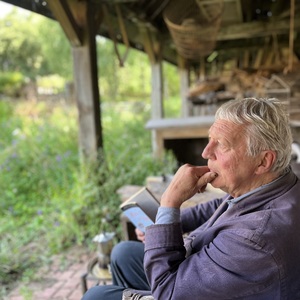You are viewing your 1 free article this month. Login to read more articles.
A rebellious writer
Forget Twitter, turn down dinner… an older author explains how he’s still getting better, decades on.
The current focus of interest by British publishers of fiction appears to be on work by young writers, with the potential of a slew of saleable books in front of them. Older novelists, it is assumed, are dated in their subject interests and literary style. As ever, this is true of some and not of others. Plenty of young people write tedious tosh and a good few of the elder generation produce books of imaginative originality. Age is not the point. What matters is engagement of the writer’s feelings and the ability to express these in an affecting form. Weighty historical research is meaningless without the acuity of personal observation of the present. The best novels explore topics known intimately by the author, where truth is found by enquiry into self.
My main purpose in writing Brian, published May 2023, was to imagine and then describe how a middle-aged man who finds daily life a relentless challenge discovers release and safety in watching cinema every night at the BFI.
A frequent visitor myself in the late 1980s and throughout the 1990s at what was then known as the NFT, I was intrigued by the discrete group of regulars who gathered in the foyer before and afterwards, discussing with eager enthusiasm the evening’s film. I admired their self-containment, their modest unconventionality.
Now that I am older it feels less challenging to turn away from accepted practice and give myself the time necessary to find and develop my own voice on the page. In my view it is not the thinking which makes the difference but the doing, the daily custom of seeking meaningful expression. Clever plans and birth-to-death character profiles can easily distract an author’s attention from the things which matter most. I feel strongly that whatever human qualities may have emerged in Brian have done so because I sought to create a person not a type, from my own head and heart.
Perseverance is the prerequisite of all creativity. And pig-headedness, the determination to outride public neglect. In the early 1980s my literary agent, the august Curtis Brown, advised against seeking a publisher for Ruth, the manuscript of my first completed novel, and asked me to concentrate instead on my established reputation for non-fiction. I promptly removed myself from their representation, since when I have been my own agent. In 1986 I found a home at Hutchinson for Ruth a year after first submitting the novel, then securing terrific reviews and, with Sceptre, a paperback edition. The public praise did me no good and in arrogant overconfidence I failed for several years to write anything of consistent quality.
Now that I am older it feels less challenging to turn away from accepted practice and give myself the time necessary to find and develop my own voice on the page
Yet, despite my age, there is much that I still want to write. Leading a secluded non-social life, never accepting invitations to attend private views or to join prize-awarding committees, nor going to any literary festivals, dinner parties, weddings, funerals or the like, I am left with plenty of time to write. I do not possess a mobile phone or television, meaning that I have never used any social media, have not once seen Facebook, TikTok, Netflix, YouTube, Twitter and the rest. I take and store no photographs, freeing me to look in living detail at people and places and art and to remember what I have seen, instead of flicking on a tiny screen posthumously through hundreds of mini-images snapped in passing haste. My direct visual memory of original works of art informs everything I do, including the recollected film landscapes in Brian. I am dismayed by the dominant practice of downloading commercial prints of movies to watch on laptops or mobile phones, in the train or over a coffee break or lying on the beach, the intricate skill and beauty of film dissipated. There is nothing quite like sitting in a large dark space staring without interruption at a high wide screen, entranced, lost in another’s vision and discovering feelings inside oneself that previously did not seem to exist. The unbroken concentration, the pure focus from beginning to end is what makes live cinema such a wonderful adventure, as described by Brian, my fictional movie-buff.
For me, the breakthrough finally came in 2018, at the age of 72, when I won the first Fitzcarraldo Editions Novel Prize for unpublished manuscripts, with a novel that had taken me five years to write, Ash before Oak. Becoming a Fitzcarraldo author alongside European writers whose work I admire has settled the more debilitating of my internal doubts. I am lucky also to be with an excellent non-fiction publisher, Thames & Hudson, with whom I have worked since the mid-1970s, most recently in 2019 with The World Exists to be Put on a Postcard, a catalogue of the exhibition which I curated at the British Museum. As with Fitzcarraldo, Thames & Hudson are independent publishers, run by the people who own them. Thames & Hudson intends to "remain true to its founding principle to provide a museum without walls", while Fitzcarraldo’s ambition is to be the kind of publishing house that publishes authors, rather than books.
Personal questioning continues, these days to beneficial rather than limiting effect, allowing me to take straightforward pleasure when a novelist-reviewer wrote: "His work resists every modern accelerant, creating a patient and precise tonic. He is easily one of the most thoughtful British fiction writers working today." Instead of ballooning up into clouds of delusion on these good reviews, as I had done when younger, I knuckle down and resolve to do better again next time.
















